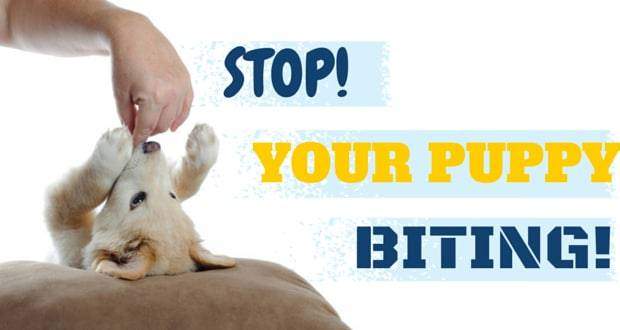Updated: July 3rd, 2023

Your golden retriever puppy is as friendly as can be – great with kids, respectful of other dogs, and not overly attentive to your cat.
Sure puppies bite, and yes, it really hurts, but you’ve been told over and over again that goldens are the most gentle of family pets. One of their best qualities is that when they’ve grown out of the exuberant puppy stage, they will never show aggression, right? Wrong!
QUICK RECOMMENDATION: My puppies have drawn blood with their teeth many times. The Milunova Pupr Pals™ Dog Toy is a plush squirrel puppet toy that helps to protect your hands from those sharp puppy teeth during play.
Yes, golden retrievers are known for their good-natured demeanor, but they are still dogs — not so very far removed from their wild cousins, and they can be unpredictable when faced with stressful, disturbing, or frightening situations.
One of our jobs as responsible dog owners, of course, is to keep our dogs safe, but we may not always be able to protect them, and we may not always be able to prevent them from biting through fear or when in pain.
What we can do is teach them bite inhibition when they’re young so that a potentially dangerous situation will not result in you losing your dog forever.
What is Bite Inhibition?
Bite inhibition is a dog’s ability to modify the pressure of his bite.
Puppies begin learning this from their mother and siblings as soon as they start to tumble around with each other in play. If they bite too hard, they are scolded by their mother or alerted with a yelp from their siblings.
Eventually, they learn how hard is too hard, and they use their teeth more gently in play.
Human Sensitive or Advanced Bite Inhibition
By the time your puppy moves into your home, they will have been using their bite inhibition skills for weeks.
But because your pup’s mother and siblings have much thicker fur than you do, your pup won’t have learnt to bite softly enough not to hurt human skin.
You’ll now have to help him to further modify his skills. Your puppy needs to learn that human beings are fragile and should be treated with care.
Can’t I Just Teach My Puppy to Stop Biting?
There are many professional trainers who recommend that you simply train your puppy not to bite.
This seems like a practical course of action, and it does work — in the short term.
Teaching a puppy not to bite will give you quick results, but it may mean they never learn how much force is safe to use on people when they are forced to bite in an emergency.
So it’s better to teach bite inhibition skills, before teaching them not to bite at all. So if they do eventually bite, they will know to hold back the pressure safely and will not cause anywhere near as much pain or damage as they otherwise might.
Why is Bite Inhibition Important?
Believe it or not, even the most gentle dog that has been trained from a young age never to bite, can react to certain triggers. Those triggers are fear and pain. Consider these situations:
- Your dog has been suffering from chronic ear infections and hates to have his ears handled. The neighbor stops by with her toddler, who immediately runs to your dog and fondles his sensitive ears roughly. What will he do?
- You and your dog are walking down the road like you do every morning when out of nowhere comes a huge dog who attacks your dog without thinking twice. You manage to pull your dog away, but in the process, your frightened dog bites your arm.
- Your sweet golden retriever has gotten themself tangled in some barbed wire while hiking. When you try and free her, she growls like you’ve never heard before. As you loosen the wire from her skin and fur, she snaps at you, biting your hand.
You may never experience any of these situations. We never want our dogs to be faced with a situation where they feel like biting is the only answer, but the truth is, these situations come up every single day, and one day it could be your dog who is scared or in pain and just doesn’t know how to react.
By teaching bite inhibition while your puppy is young, you will be far safer and ready for any of these situations should they occur.
Teaching Advanced Bite Inhibition
Following is a general guide to the bite inhibition skills your puppy learns and when, as well as where you should aim for their skills to be at certain ages.
Birth to 8 Weeks — Mom is the Boss
Your pup’s mom is the best and toughest teacher there is. She will start the puppies off by teaching them how rough is too rough during nursing and play.
These lessons begin when the puppies start nursing (day 1) and continue until the day you pick your puppy up from the breeder.
8-12 weeks — Persistence and Repetition
Your puppy will naturally bite you, your kids, your shoes, just about everything. It’s the way young pups explore their world. It’s your job to teach them that if they bite you too hard, playtime is over.
It’s often recommended that you yelp or squeak, mimicking a noise that a puppy sibling might make. This works for some puppies, but for others, it just seems to arouse the pup and make matters worse. You will have to experiment to find out what works for you and your pup.
You should withdraw all of your attention from your puppy for very hard bites. If you have to get up and walk away that’s okay. If you have to give your puppy a few minutes of down time in the crate, that’s okay too. It’s also okay to allow less painful biting and mouthing at this point. Remember, we’re teaching bite inhibition – biting softly – and not they shouldn’t bite at all yet.
Do not over-correct your puppy so they become afraid of biting. This is a process they’re working through, and if they’re afraid of you, they won’t learn proper bite inhibition.
After your puppy has calmed down, use a chew toy as a reward and let them chew it in your lap or lying by your side. This teaches you puppy that there are other ways to keep their mouths and teeth busy.
3-5 months — Reduce All Jaw Pressure
By about three months of age, your puppy will have learned to keep from biting too hard during play.
As they grow and respond to you, you can up your sensitivity to the bites you’re willing to receive. By four or five months, all force behind play bites should be eliminated.
If you’re raising your puppy with other family members, it’s important that everyone is on board with this training. Kids tend to play rough with puppies, and puppies will get rough right back. Your puppy needs to know that every human being is sensitive to their bites, not just you.
5-6 months — No More Mouthing
Bite inhibition is the final goal here, which is why we’ve allowed some mouthing up until this point. But of course it’s not acceptable for your adult dog to be mouthing humans at all.
At about five months, start transitioning to “no mouthing or biting ever.” You do this the same way you started out at eight weeks, only now you will be ending play each and every time you feel those puppy teeth on your skin.
Before too long, your golden retriever will learn that biting just isn’t as much fun as other types of play.
Tips for Getting Through Your Puppy’s Mouthy Stage
- Adjust your expectations – Teaching your puppy bite inhibition can be a temporarily painful process for you and your family members. It is a process that sometimes lasts months, depending on your puppy. Be prepared for this, and remember that long-term results in your adult dog are more important than curtailing puppy bites (as painful as they may be).
- Supervise your puppy around children – If you have young children at home, you will have to think carefully about how you will protect them and your puppy. Little puppy teeth can cause a lot of pain, especially when your pup is still learning to control those urges. Young children can also cause a lot of pain to small puppies. Always supervise very carefully when your pup and children are together. If you can’t be right there, it’s better to crate your puppy.
- A tired puppy is a happy puppy – It will be much easier to teach bite inhibition if your puppy is not bouncing off the walls. Make sure they get enough exercise every day. Not only will this help with training, but it will also help prevent all kinds of other destructive behavior.
Conclusion
Teaching bite inhibition to your golden retriever puppy is a gift you give to your pup that will last forever.
It’s never pleasant to think about all the little and big emergencies that could occur that would cause your dog to bite.
But by teaching your dog this crucial skill early on, you won’t have to think about these emergencies, because you will already have prepared for them.
Further Reading
Please find below some further reading on the subject, a couple of articles I believe will really help in your understanding of the concept of bite inhibition and – if you’re still on the fence – hopefully convince you of it’s importance:
- More on bite inhibition (because it’s so important) – From DogStarDaily
- How To Teach Your Puppy Not To Bite – From DogGoneSafe
- Puppy Biting – From SiriusPup




8 Comments
Gerry Radona Gruspe
I am a newby goldens owner and found all you articles bout goldens very informative and interesting to read and consider. Thanks for this publication.
Wendy
Thanks Gerry, I’m glad you find the site useful and it’s always nice to receive positive feedback 🙂
Natalie
Thanks for the info. New golden mom here of a 1 yr old rescue who mouths.
Estefania
I love your website. Thanks so much. I have a 3 and a half months old golden retriever who’s biting real hard a couple of times per day and having puppy tantrums a few more. I tried to teach bite inhibition but it’s proving hard and it’s very painful. Anyways I will try your tips here and see if they work. Thanks again!
Jenny Lebrilla
Thanks for this information. 🙂 I should do this to my own golden.
Melanie Goodwin
We have a 10 week old Golden. Her biting us was really painful, but after using your technique of yelping when she bit us to hard….she has already learned after only 2 days to bite us gently. Worked better than anything else we tried
Thank you soberyuch for this info
Patti Lukon Wudi
We are getting litter mates. Any and all suggestions to help with training are greatly appreciated.
Nancy
thank you for this post. my 14 week old Hannah most times hates the leash, but it is keeping her from running in the street. sometimes( every day) its like something snaps in her brain and she gets very aggressive and keeps charging, growling and biting me to the point I cant stop her and have a very difficult time picking her and and getting her in. This leaves me in tears. Sometimes even in the house she gets like this and i gate her in the other room. Is there help for her? please reply. Thank you